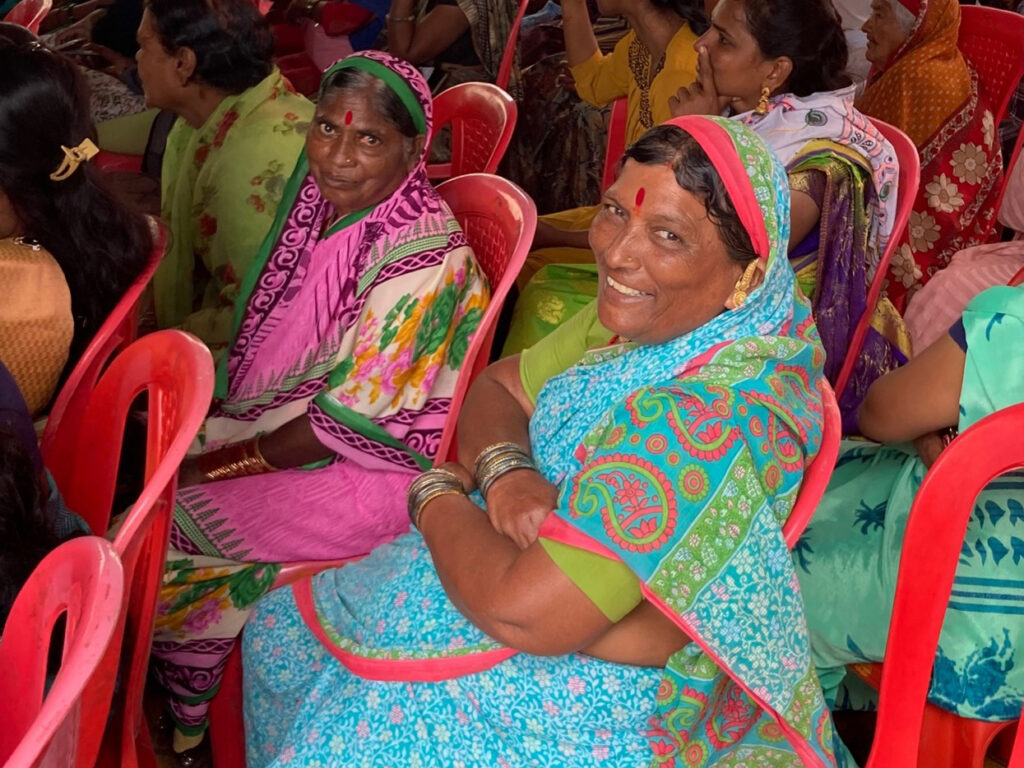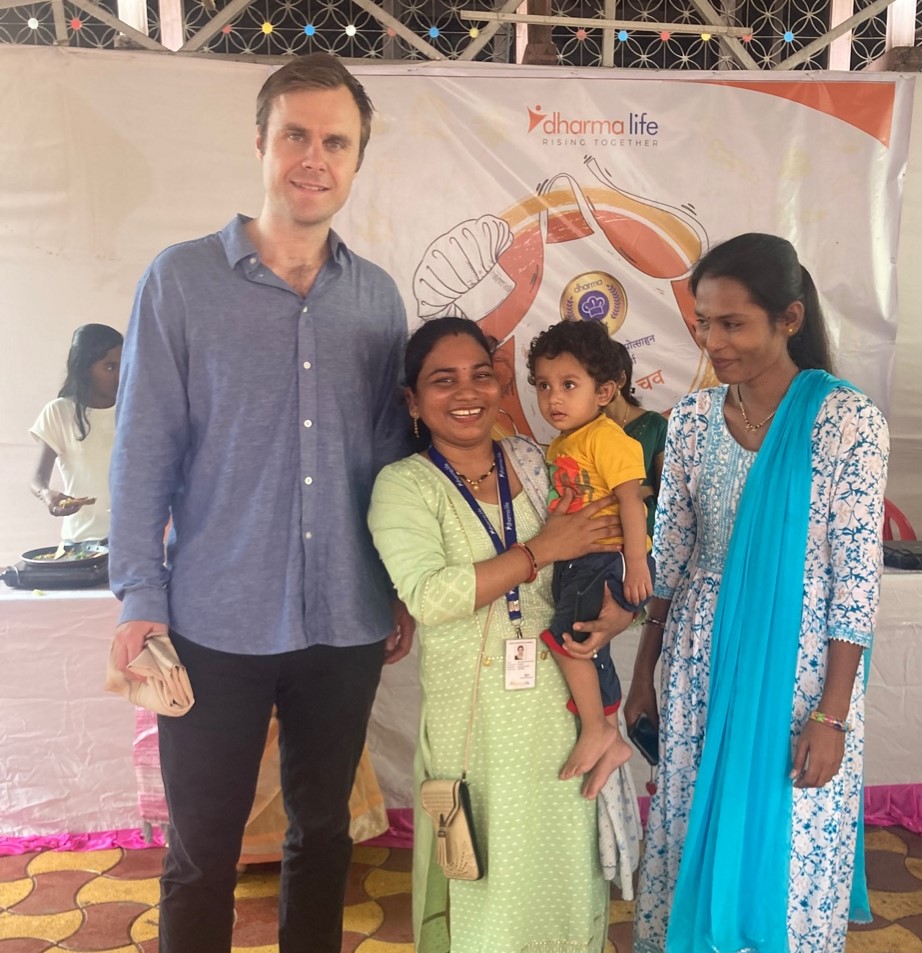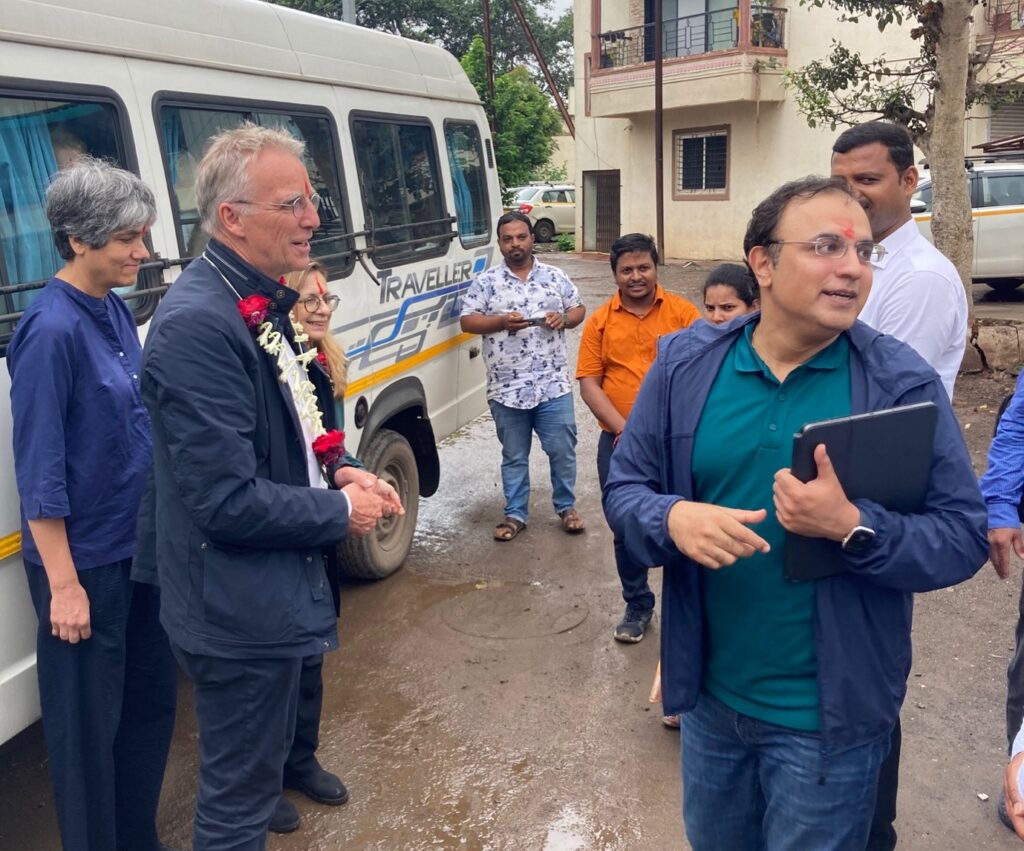Former intern Chris Wright (LBS MBA 2023) reports on his five months travelling across the Indian subcontinent as a DL Labs intern. From conducting research on-the-ground to liaising with high profile entrepreneurs, here’s how the experience informed his understanding of social enterprises.

Dharma Life is an NGO driving progress through a network of 17,000 rural entrepreneurs across 50,000 villages in rural India. CEO Gaurav Mehta (LBS MBA 2010) is on a mission to deliver services in clean energy, healthcare, microfinance, education, gender empowerment and employment. As well as providing insights from academia to support Dharma Life, the Wheeler Institute supports academic research in the field alongside Gaurav’s team. Professor Rajesh Chandy ( Professor of Marketing and the Tony and Maureen Wheeler Chair in Entrepreneurship at London Business School, and Co-Academic Director of the Wheeler Institute) and Gaurav lead this collaboration and DL Labs offered me the chance to go to India for five months, working as an intermediary between the academic team in London and Dharma Life in India.
I moved between Delhi, Varanasi, Lucknow, Ahmedabad, Pune, and rural areas in Uttar Pradesh, Gujarat, and Maharashtra, working with Gaurav on a day-to-day basis and checking in with Rajesh for direction regarding upcoming research. The Wheeler Institute supported my accommodation, travel, and wellbeing.
I predominantly worked on two ongoing Dharma Life Labs projects: the Jaya Programme and the Gender Results-based Finance study.
The Jaya Programme
The Jaya Programme is an initiative that helps women realise their employment potential. These women are trained to become tailors in their local villages and then integrated into the workforce after a period of bespoke mentoring. There are three main challenges: overcoming resistance to notions of gender empowerment; delivering effective training; and translating new-found skills into tangible socio-economic progress.
Gaurav’s team addresses these challenges via the ‘Jaya Funnel’. This is a phased pathway: women are initially sensitised and counselled, then enrolled and trained. Then, they either secure formal employment via links to government schemes or private enterprises or start their own businesses. The programme has sensitised 120,000 women, counselled 43,000, enrolled and trained 15,000, and helped create 6,250 new businesses or jobs. The goal is to reach 1 million women and expand the training to include AI and coding.
As a Dharma Life Labs intern, I was lucky enough to be see all aspects of the programme first-hand. Gaurav has a network of local teams across the country. These teams and I frequently visited the homes of the Dharma Life beneficiaries, hearing these remarkable women tell us about their experiences of setting up their own businesses. We collaborated to develop training content. We also reached out to Dharma Life’s numerous partner organisations, such as UK Aid, the German Agency for International Cooperation (GIZ), Unilever, Accenture, and the Ikea, Shell, BMW, and Ford Foundations.
Joining Professor Chandy in interviewing Dharma Life Entrepreneurs (DLEs) was particularly rewarding. Once, I spoke to an interviewee that had woken at 4 o’clock to do her household chores before daylight in order to give herself time to attend. The Dharma Life team had collected her from her village and driven her 30km to the event. The DLE said it was the furthest she had ever been from home – and went on to explain how the Jaya Programme had given her a sense of pride and purpose. It was so re-assuring to hear this DLE, and so many others like her, vocalise the importance that Dharma Life plays in her identity and self-esteem.

Gender Results-Based Finance (RBF)
The Gender RBF study is a research project that quantitatively assesses the impact of community engagement on the confidence and performance of Dharma Life beneficiaries, as well as the perception of local communities towards women. As a part of my internship, I helped to address the significant operational challenges associated with interviewing 1,000 women from across Uttar Pradesh, a state of almost 250 million km2, over a six-month period. Similarly, the Dharma Life intern was responsible for helping to ensure academic integrity and best practice.
The work involved strong organisation and communication skills. We ensured the women would be registered on arrival, interviewed by the enumerators, and recorded on video for subsequent facial and body language analysis. The DLEs also receive follow-on training, so they can continue their development as DLEs, before being driven back home after nightfall. At the same time, the data collection team and I would work together in the rural hotels, calling back to the digital team in Delhi, to ensure all necessary material had been sufficiently captured for analysis.
Connecting with high profile stakeholders was an essential part of the role. I constantly liaised with academics and entrepreneurs including: Rajesh Chandy; Om Narasimhan, Professor of Marketing at London School of Economics; and Iris Steenkamp, Assistant Professor of Marketing at Bocconi University. Assurance visits to India with Rajesh during the design phase, and a ten day in-person training package delivered by Iris at the start of the study were essential. I was an active part of daily conference calls between the academics in Europe, Gaurav Mehta in Delhi, COO Rajeev Ranjan in Bangalore, and Pramod Shukla’s team on the ground in Uttar Pradesh.
The results are due to be shared in 2024. The hope is that the study will demonstrate and quantify the impact of employment and leadership in enabling gender empowerment.

The Internship as a whole
It was a brilliant experience and fantastic to be a part of the contribution DL Labs Labs is making. The experience gave me perspective in terms of what constitutes hard work. The Dharma Life Entrepreneurs never stop. I saw a constant, relentless effort as these women do household chores, support their families, do additional training and education, work the land, and earn a living. Similarly, the Dharma Life team work tirelessly for the organisation – and each other. It is amazing to observe someone like Gaurav up close. Exposure to people who have built organisations themselves, and who have ‘dared to be different’, is rare and invaluable.
Working independently and as a part of a team in remote environments, on such intense projects, has made me a more resilient person. I think that my experience of the DL Labs Internship will prove valuable regardless of my future career path or life choices. I cannot recommend the opportunity highly enough.
About Dharma Life Labs
Founded in 2009, Dharma Life is an social enterprise dedicated to poverty alleviation through rural entrepreneurship. It focuses on improving quality of life in rural India through an entrepreneurship model that provides rural youth with livelihood opportunities and low-income rural households access to socially impactful products and services. Rural entrepreneurs are identified, selected and trained to become social change makers in their villages by addressing the issues of awareness, accessibility, and affordability for social impact products as well as services. These entrepreneurs help build an ecosystem for community engagement, behaviour change and collective participation through extensive awareness campaigns, product demonstrations and behaviour change activities.
Dharma Life is addressing various SDGs, with focus on gender equality, poverty alleviation, clean water and sanitation, good health & wellbeing, indoor air pollution, access to clean energy, sustainable communities and climate action. As of 2024, Dharma Life has created a network of 16,000+ rural entrepreneurs, more than 75% of which are women entrepreneurs who have reached more than 10 million beneficiaries in 40,000+ villages, across 13 states of India.
Discover our research portal and subscribe to our mailing list now
